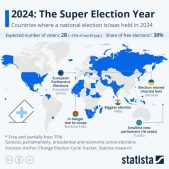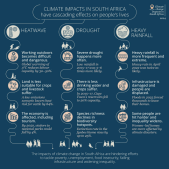The year 2024 is a big year for elections all over the world. No less than 50 countries affecting billions of people will have elections this year.
Although many countries have unique issues, job creation, the economy and now immigration tend to be issues that most candidates, and most voters, focus on.
Or at least this is the norm in established democracies.
However, climate change or issues relating to the environment is a big enough global issue to justify an annual United Nations (UN) conference that sets our rules and regulations on what countries should be doing – the COP talks.
But does a party’s stand on the subject sway voters?
In close contests, such as that expected in the US later this year, it can.
Former US President Donald Trump could once again pull the United States out of the Paris climate accord if he wins November’s election. A Vanderbilt University study suggests voters who believe climate change is an important issue are significantly more likely to vote for the Democratic candidate.
There’s likely to be an election in the UK this year too, and Conservative Prime Minister Rishi Sunak has tried to reverse course on key policies, such as a ban on the sale of gas and diesel vehicles.¹
Many countries in Europe are moving to the right, and that’s bad for the climate crisis. The party of far-right leader Geert Wilders won general elections in the Netherlands in November after he vowed to shred the EU climate deal. He will not be the prime minister, because his coalition partners have withdrawn support, but he still holds much power to affect policy. There’ve been protests by farmers in Germany and France against environmental regulations.
New Indonesian president Prabowo Subianto, a former military general with a checkered human rights record, has pledged to accelerate action toward net zero, while also investing to develop the country’s oil and gas infrastructure.

So, back to South Africa: is climate change and issues relating to the environment an issue in our own elections? There answer is yes, but not a big one. Despite being one of the country’s most vulnerable to the effects of climate change, the politicians are focusing on many on the usual, and mostly the same issues – poverty, joblessness, security, immigration, corruption and of course Eskom. And that’s where climate initiatives do come into play.
Climate change poses a threat to South Africans by reducing incomes, undermining food and water security and raising the cost of living. In addition, South Africa faces a tough transition to cleaner energy, because for many, dirty energy from coalmines that emit greenhouse gasses is still better than no energy at all.

Climate Change policy feature in most of the party manifestos, largely because the energy issue is one of the biggest crises facing consumers and businesses right now.
The African National Congress (ANC) will struggle since, as the ruling party since 1994, the blame for our power crisis is laid on their doorstep. Their manifesto promises cheaper and subsidized solar power, prioritising green technologies, and mitigating the effects of climate change and the changes that are made so they do not negatively affect communities. The ANC also promises to increase research and development spending and climate changes is one of the named fields.
The Democratic Alliance (DA) deals with climate change largely in the context of its plans to fix the energy crisis. The focus is on making self-generating power for homes easier and cheaper, and diversifying the energy sector. The DA also talks about ‘prosumers’, people who generate more than they need, and could share their extra power with the grid. The DA also commits to achieving net zero carbon emissions to reduce the impact of energy generation on the climate.
Climate Change is a big issue for the Economic Freedom Fighters (EFF), perhaps not surprisingly because of its large support base amongst the youth. The EFF promises to halt the decommissioning of the coal fired power stations, and will terminate all existing contracts with independent power producers and. But it will direct Eskom to develop an internal substantial renewable energy division to build its own infrastructure, focusing on solar, wind, and hydro-energy, and researching to improve their reliability. The EFF manifesto devotes a whole section on the environment and climate, and it begins by promising to create one million jobs aimed at transitioning South Africa from wholly coal-based energy sources to a fair mix of energy sources comprising fossil, nuclear, and renewable energy. The section goes into detail on how to help small business develop climate friendly business related to the environment, and will spend money on both research and development and education.
The Inkhata Freedom Party (IFP), like most parties, supports a mix in energy production, including nuclear and hydroelectric power. It also suggests solar panels should be installed in all new government-built houses.
The Freedom Front Plus (FF+) wants to unbundle Eskom, and privatize the separate entities. The FF+ also plans a focus on renewal energies.
Rise Mzansi also has a whole section on the climate crisis, focusing on mitigation, mixed energy production and making sure the poor are not always the greatest victims when climate change causes extreme weather.
The Good Party uses stronger terminology, although its manifesto is short. It talks about accepting the science of climate change and the moral obligation to act. In the South African context, it means the preservation and fair distribution of natural resources, and just transition to a green economy. The headline promise is to stop loadshedding with renewable energy.


